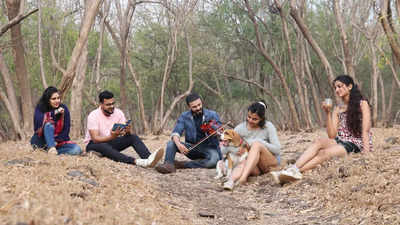Trending
Goodbye hustle, welcome slow living
Vineet Kalshetty has embraced slow living by adopting a more intentional morning routine. This shift reflects a broader trend among young Indians in big cities seeking to escape hustle culture for a more balanced, fulfilling life. Slow living encourages wellness practices, deepens relationships, and allows for rediscovering joy, despite challenges like overcoming guilt and redefining success.
There’s been a conscious shift in Vineet Kalshetty’s morning routine over the last few months. Now, he starts his day with a quiet bicycle ride through lush, palm-lined roads, a far cry from his once-hectic mornings filled with hurried coffees and early meetings. This new routine is part of adopting a slower, more intentional life. “I always thought success was tied to constant motion,” Vineet reflects, adding, “But I’ve realised peace brings more clarity, purpose, and joy.” Like Vineet, there are a lot of young Indians in big cities who are stepping away from the relentless demands of packed schedules and never-ending deadlines. As a result, slow living has been picking up speed and is touted to be a buzzword in 2025.
What is slow living?
Slow living is not about doing less, but doing things with intention, about prioritising what truly matters. Whether it’s savouring your morning coffee, investing time in hobbies, or spending meaningful moments with loved ones, slow living makes space for joy and reflection.
Slower living isn’t about stopping or giving up ambition. It’s about pursuing life and work in a way that nurtures your mind, body, and relationships. For many, it’s the antidote to the burnout that comes with constant busyness
Arjun Desai, a lifestyle coach
As more people embrace the slower life, it’s clear that the choice to step back from the hustle is also about finding a more sustainable, fulfilling way of living. Dr Aparna Ramakrishnan, consultant psychiatrist at Kokilaben Dhirubhai Ambani Hospital in Mumbai, attributes this to evolving priorities. “Many of us are stressed and burnt out due to the hectic work and hustle culture, which barely offers opportunities for self-care, personal growth, and work-life balance. Pollution, overcrowding, and high cost of living also add to the dissatisfaction. In contrast, a more relaxed, less stressful environment, and low cost of living offer an opportunity to connect with nature and foster meaningful relationships in close-knit communities.”

A couple practising yoga by the beach (Image: iStock)
The appeal of slower living
Reclaiming wellness: Encourages practices like yoga, gardening, and mindful eating. “I now have time to enjoy a real breakfast,” shares Vineet, adding, “Something as simple as a quiet meal can transform your day.”
Deepening connections: A slower life allows people to cultivate deeper relationships, with family, friends, and even themselves. “For years, I hardly spent time with my children,” says Shwetali Jagtap, a dentist who shifted her work schedule to prioritise family. “Now, I schedule my work around their needs, not the other way around,” she adds.
Rediscovering joy: With less pressure to constantly achieve, people are rediscovering the things that make them happy - painting, playing music, or simply enjoying a quiet walk. “It’s about finding joy in the little things,” says Shreeraksha Vinod, who runs pottery workshops.

A bunch of fyoungsters enjoying the slow life (Image: Shashank Sane)
How to embrace slow living
Start small: Introduce simple habits, like taking a 15-minute walk or meditating in the morning.
Unplug regularly: Take digital breaks to reconnect with yourself and your loved ones.
Focus on the present: Practice mindfulness in daily tasks, whether eating or cleaning.
Define your priorities: Ask yourself what truly matters, and let go of unnecessary obligations.
(As shared by Arjun Desai, a lifestyle coach)
Challenges in slowing down
Overcoming guilt: Many feel pressure to ‘keep up’ with peers
Adjusting to stillness: The slower rhythm can feel unfamiliar for those used to fast-paced routines
Letting go of expectations: Slowing down means redefining success
(As shared by Kasturi Subha, clinical psychologist)
For years, success was tied to a paycheck, a title, and a home in a city. But today’s professionals are defining success differently with happiness, health, and a sense of balance. This doesn’t mean giving up ambition though
-Kasturi Subha, clinical psychologist
End of Article
FOLLOW US ON SOCIAL MEDIA
Visual Stories
Tired of too many ads?go ad free now










